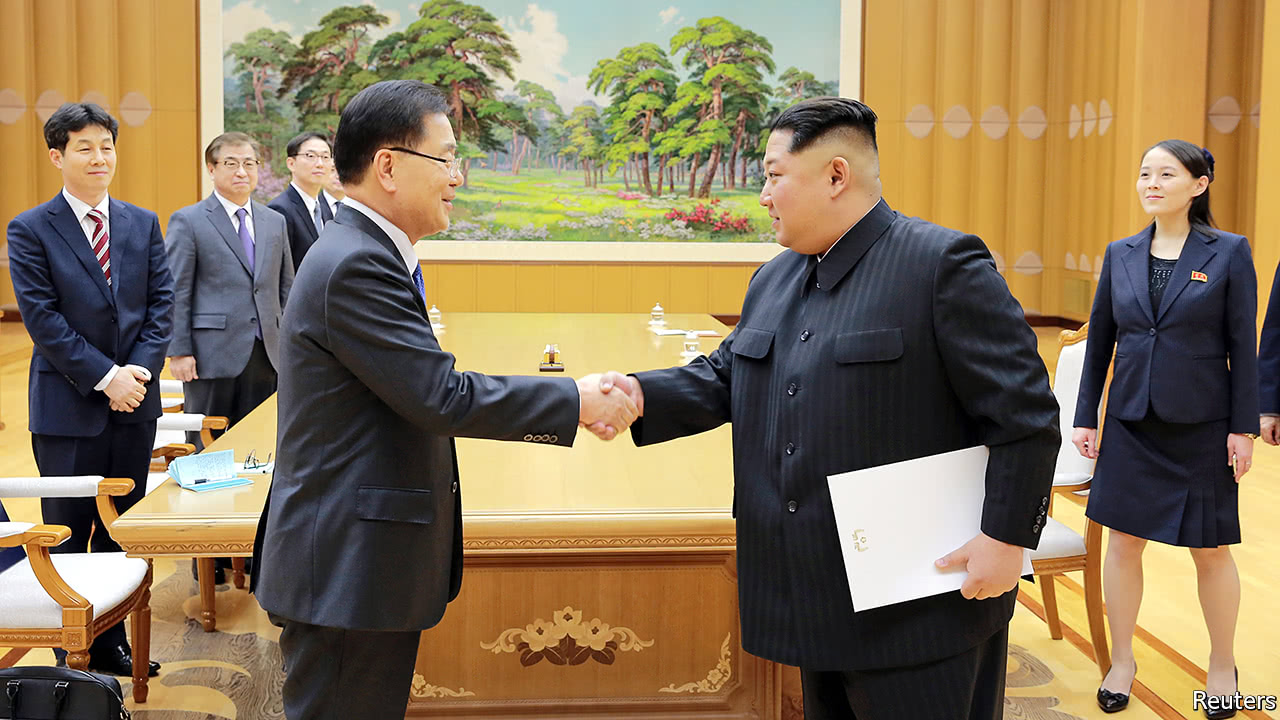Treat Kim Jong Un’s nuclear offer with caution
His demands are a non-starter

AFTER months when the prospect of a nuclear war on the Korean peninsula seemed all too real, it is a relief that America and North Korea may soon start talking to each other. A flurry of diplomacy has paved the way for negotiations. North Korean athletes and cheerleaders attended the Winter Olympics in Pyeongchang; South Korean officials went to Pyongyang and met the North Korean dictator, Kim Jong Un. However, when Mr Kim suggested on March 6th that talks might lead to him giving up his nuclear weapons, diplomats were astonished. The Trump administration’s policy towards North Korea of “maximum pressure and engagement” has been all about the pressure. Here, many feel, is a chance to try some engagement.
That must be right. But past experience suggests that an ocean of scepticism is warranted (see article). In the past North Korea has used nuclear talks to win concessions and money in return for commitments it has then broken. Mr Kim, who inherited his throne from his equally despotic father and grandfather, may also have inherited their duplicity.
Despite his macho posturing, Mr Kim is feeling the sanctions that America has applied as punishment for his testing of missiles and nuclear devices. China’s unwillingness to risk the collapse of the North Korean regime has limited the bite of the sanctions, but new restrictions imposed by the UN are taking a toll. One sign was the scaling back of North Korea’s winter military exercises, apparently to save fuel as imports of oil and refined petroleum products have become scarcer.
The rumours in Washington about a bloody-nose strategy to punish Mr Kim for testing nuclear weapons may also have got the dictator’s attention. The administration denies having talked in those terms, but Mr Kim cannot rule out that President Donald Trump will order a pre-emptive strike on his nuclear facilities. The communist god-king knows he would have to respond, and for all his braggadocio he knows that escalation could lead to his own demise, as well as his regime’s. Asked what had brought Mr Kim to the negotiating table, Mr Trump said: “Me.” For once, he may be right.
Nonetheless Mr Kim surely feels that he would enter talks from a position of strength. He already has a missile with the range to strike the United States and will probably soon be able to equip it with a thermonuclear warhead. He also has the conventional and nuclear firepower to devastate Seoul, South Korea’s thriving capital. No one really wants to fight him.
America needs to show its allies (and China) that it is open to talks, while making clear that the demands North Korea is making in exchange for denuclearisation are unacceptable. Even if talks result only in measures that reduce tension and the risk of nuclear miscalculation, they will have been worthwhile. Alas, the State Department has just lost its point man on North Korea and it still has no ambassador in Seoul. Dealing with a despot requires diplomacy—and diplomats.
That must be right. But past experience suggests that an ocean of scepticism is warranted (see article). In the past North Korea has used nuclear talks to win concessions and money in return for commitments it has then broken. Mr Kim, who inherited his throne from his equally despotic father and grandfather, may also have inherited their duplicity.
Latest stories
Women’s wealth is rising
What is Donald Trump hiding? The answer may bore you
Machines are getting better at literary analysis
The Trump administration sues California over sanctuary protections
For Dutch Jews, an overdue reassurance and an ancient dilemma
Retail sales, producer prices, wages and exchange rates
The rumours in Washington about a bloody-nose strategy to punish Mr Kim for testing nuclear weapons may also have got the dictator’s attention. The administration denies having talked in those terms, but Mr Kim cannot rule out that President Donald Trump will order a pre-emptive strike on his nuclear facilities. The communist god-king knows he would have to respond, and for all his braggadocio he knows that escalation could lead to his own demise, as well as his regime’s. Asked what had brought Mr Kim to the negotiating table, Mr Trump said: “Me.” For once, he may be right.
Nonetheless Mr Kim surely feels that he would enter talks from a position of strength. He already has a missile with the range to strike the United States and will probably soon be able to equip it with a thermonuclear warhead. He also has the conventional and nuclear firepower to devastate Seoul, South Korea’s thriving capital. No one really wants to fight him.
Don’t hold your breath
The chances of the talks getting anywhere remain low. When Mr Kim suggests he would give up his nukes for the right security guarantees, he means the withdrawal of American forces from the south and the start of a process to reunite the peninsula on his terms. Neither is going to happen—rich, democratic South Korea is not about to throw in its lot with a North still run by a tyrant. Still, Mr Kim hopes to divide the South from its American ally by making offers that will play well in Seoul, such as opening new lines of communication, bringing separated families together and co-operating on humanitarian projects. At the very least, he will be betting that he can give China and Russia the cover they need to relax sanctions.America needs to show its allies (and China) that it is open to talks, while making clear that the demands North Korea is making in exchange for denuclearisation are unacceptable. Even if talks result only in measures that reduce tension and the risk of nuclear miscalculation, they will have been worthwhile. Alas, the State Department has just lost its point man on North Korea and it still has no ambassador in Seoul. Dealing with a despot requires diplomacy—and diplomats.

No comments:
Post a Comment